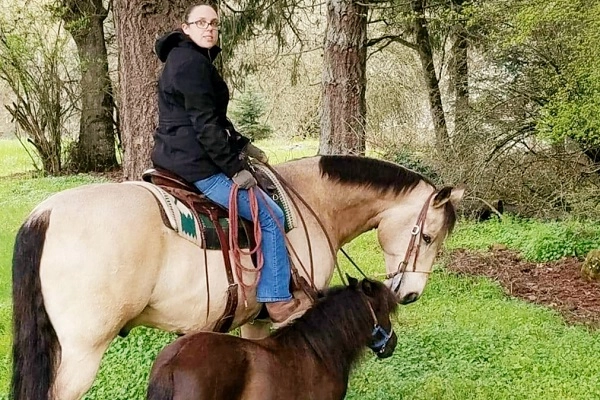The joy of just being awake: Disorder diagnosis paves way to better sleep

Megan has sparkling hazel eyes and a neatly pulled back ponytail. She works at a barn and exercises horses. She has a supportive fiancé. She loves baking and decorating elaborate cookies for friends and crochets animal toys by the dozens.
For most of her life, however, the 36-year-old could barely get out of bed.
“As long as I can remember, I couldn’t wait to crawl back each night,” she said. “I’d make excuses for not remembering things. My friends teased me about being spacy.” For years she’s also lived with a diagnosis of depression.
Her story shows the power of not giving up — and finding a doctor who took her seriously.
Mental health … or something else?
Depression runs in Megan’s family, so she assumed that was her diagnosis. When her mother committed suicide 10 years ago, Megan threw herself into therapy. “I was working through childhood trauma — my depression was much better — but I was still sleeping 18 hours a day, all fragmented,” she said. “I hated to drive. I’d fall asleep watching movies on the couch with friends. Even horror movies! I knew something wasn’t right.”
Her therapist told Megan to advocate for a sleep study through her doctor, who finally referred her to the Sleep Center in 2019. And it turns out Megan was right. Something else was wrong.
After the study with sleep specialist Thye Schuyler, MD, Megan was diagnosed with type 2 narcolepsy, a sleep disorder of the central nervous system. It causes excessive daytime sleepiness and interferes with sleeping at night.
“Dr. Thye was the first person who didn’t just assume I was depressed. He listened,” she said. “I said, you mean I’m not just lazy? He said, of course not.”
Megan’s Fitbit showed her tossing and turning 33 percent of the night. The study showed similar results and a nap study done the next morning — after a full night’s sleep — showed she fell asleep again within 3 minutes.
After a new regimen that includes medications and healthier bedtime habits, she tosses and turns only 10 percent of the night. “I wake up rested; I have energy for a shower — isn’t that sad?” she laughed.
Narcolepsy often misdiagnosed
Megan describes her treatment as life-changing. “Knowing I could get help took so much guilt and shame away,” she said. “I can’t emphasize it enough, be your own advocate, and you’ll meet doctors like Dr. Thye who listen.”
Megan’s story is common among people treated for narcolepsy. “Our patients often struggle for years before coming to us,” Dr. Schuyler said. “They’re often incorrectly diagnosed and treated by well-meaning providers. Megan never gave up and is now making incredible progress. She’s one of our favorite patients!”
Asked what she appreciates most from her new life, Megan thinks for a moment and says, “Honestly, it may sound ridiculous ... but it’s just being awake. Being part of life.”
Dr. Thye Schuyler, Sleep Center medical director, is a board-certified neurologist and sleep specialist. Learn more about the Sleep Center here.